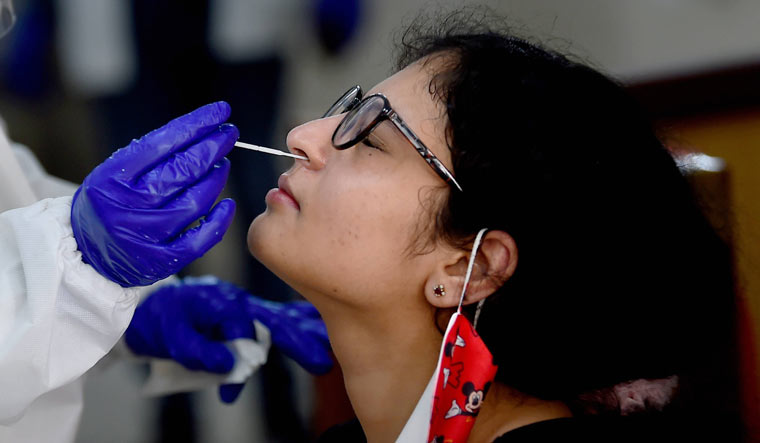After a letter from the director general of the Indian Council of Medical Research—which directed hospitals to fast-track the remaining trials of the indigenous vaccine for COVID-19—sparked fears on the vaccine’s efficacy, and a clarification later from the ICMR that quickening clinical trials was only meant to cut unnecessary red tape, Union Health Minister Harsh Vardhan said the ICMR should be allowed to do its job, sans any controversy.
"I am not commenting on the vaccine now. Let's see how long it will take to develop the vaccine," he said to THE WEEK. When asked if fast-tracking the process has the backing of the government, Vardhan said, "Obviously, the government would want a vaccine for the use of public soon. Let's wait for now. Let the ICMR do its job."
The August 15 target to launch the indigenous vaccine was mentioned in a letter that the ICMR's DG Balram Bhargava wrote to 12 hospitals selected for carrying out clinical trials of Covaxin, a vaccine against coronavirus being developed by Bharat Biotech in cooperation with the National Institute of Virology. While some say there is a needless haste being shown to expedite clinical trials, others say this is only to create a feel good factor among the masses, and generate hope in these distressing times.
In the letter, dated July 2, Bhargava instructed officials in select hospitals to go in for subjects and complete the trial at the earliest. He said the plan was to launch the vaccine for public use by August 15. Some members of the scientific community believe that Bhargava's letter was to help the Union government score political points during the time of the Independence Day. Narendra Modi, they say, wants India to be the first country in the world to launch its own indigenous vaccine against COVID-19. And, ideally, he would want to announce the same on an important occasion.
Interestingly, a note from Bharat Biotech, prior to the letter from Bhargava, had said the results of phase I and phase II trials would be out only by October. "Based on the success results of Phase I and Phase II, which would be out by October 2020, we will progress to the larger clinical trials," the note had said.
In a press release on July 4, the ICMR said its process is in accordance with globally-accepted norms to fast-track the vaccine development for diseases of pandemic potential. "All other vaccine candidates across the globe have been similarly fast-tracked," it said.
The ICMR further said, "The letter by the DG to investigators of the clinical trial sites was meant to cut unnecessary red tape, without bypassing any necessary process, and speed-up recruitment of participants."
'Fast-tracking not a wise step'
Some doctors have qualms on the success of Covaxin. Said Ahmed Subheir, a Kerala-based neurologist, "Fast-tracking the vaccine in this manner is not a wise step. We should not get in any race to be the first country in the world to produce the vaccine. No question that the vaccine is necessary at the earliest. But, compromising the quality of trials may be counter-productive. If we are lucky we may hit the bull's eye, but if we fail, it could be catastrophic."
Manu Krishnan, a researcher in Amrita Centre for Nanosciences in Kochi, said the vaccine that the ICMR is planning to launch seems like a hurried-up product. "From the surface viewpoint, that is. Also, people can get infected multiple times, casting doubts on how effective it will be as a one-step solution."
Krishnan said the onus is on India to prove to the world that it launched its own vaccine quite scientifically. "Science works on proven facts, and when you have lives of 1.3 billion people at stake, it is not okay to proceed without ample supporting evidence. There are around 110 COVID-19 vaccines, under different stages of development, around the globe. None of them will venture out to declare a deadline, because there is a scientific protocol to be followed. Having said that, if you have positive data, and you are following all regulatory procedures, it is good to speed-up," said Krishnan.
Mandatory vaccination?
It also remains to be seen whether such a vaccine, once it is available for public use, will be made compulsory for the public. They say there is a legal backing that gives the government the power to enforce mandatory vaccination. Apparently, some clauses in the National Disaster Management Act of 2005 mentions that it is possible for the government to order mandatory vaccination through the agencies concerned. Also, the Epidemic Diseases Act of 1897 authorises the government to take all measures necessary, including vaccination, to prevent the spread of an epidemic.
The Central government, if it wants, can consider foisting a price on people who do not obey. Take for instance, the Passport Act of 1967, where there are clauses that give the government the power to refuse the issuance of a passport, or cancel an issued passport, to any person who does not take vaccination. Also, the government can impose a requirement for vaccination on all people who wish to enter India.
Said Biji Manikoth, an advocate in the Kerala High Court, "In my opinion, the government can only try to convince the public to get vaccinated. No sensible government can compel a person to be vaccinated. This, especially when it is a new vaccine. The Epidemic Diseases Act, essentially, empowers the government to take necessary measures to prevent the spread of the pandemic. Here in India, the mandatory vaccinations are given as per the National Health Mission's Universal Immunisation Programme, on the guidelines of the WHO, for the protection of children from preventable diseases."



